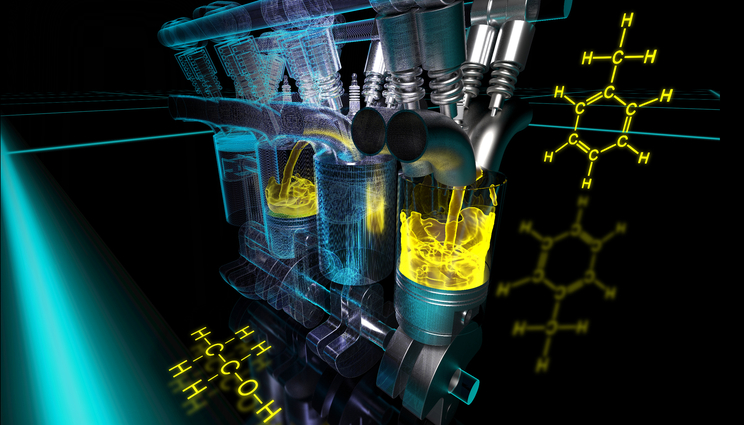Lab scientists optimizing high performance fuels for advanced internal combustion engines
 (Download Image)
An artist's rendition of an internal combustion engine with fuel molecules. Image by Adam Connell/LLNL
(Download Image)
An artist's rendition of an internal combustion engine with fuel molecules. Image by Adam Connell/LLNL
In support of the Department of Energy’s (DOE) Co-Optimization of Fuels & Engines (Co-Optima) initiative, Lawrence Livermore National Laboratory (LLNL) scientists are developing models of high performance fuels to see how they would perform in advanced internal combustion engines.
The DOE national research effort is providing industry with the scientific underpinnings needed to accelerate introduction of high-performance fuels and engines that reduce energy consumption, improve air quality and lower drivers’ costs. One recent study reveals how fundamental research has identified representative blend stocks from five chemical families that could be blended into gasoline for better performance.
These new blend stocks, co-optimized with advanced gasoline engines, show potential to improve passenger vehicle fuel economy by 10 percent. The LLNL combustion simulation team is working to optimize fuels and engines by examining new fuel blends with high-performance fuels and identifying their effect on key fuel properties that enable high-efficiency and performance in advanced combustion engines.
A second recent study, Efficiency Merit Function for Spark Ignition Engines, outlines a new mathematical equation to quantify the fuel efficiency potential associated with different fuel properties. The goal of this research is to provide American industry with the scientific foundation needed to maximize vehicle and fuel performance and efficiency, thereby enabling increased fuel economy and more affordable transportation. For a typical American household, transportation costs are second only to housing expenses.
"Increasing the efficiency of internal combustion engines is one of the most cost-effective approaches to improving the energy efficiency of new vehicles in the near- to mid-term in conventional, hybrid and plug-in hybrid electric vehicles," said Daniel Simmons, principal deputy assistant secretary for the Office of Energy Efficiency and Renewable Energy (EERE). "Researching engines and fuels as a system offers the opportunity to improve the affordability and efficiency of future gasoline engines for American families and businesses."
In 2017, U.S. petroleum consumption set a record of 9.8 million barrels per day, with transportation accounting for 70 percent of that fuel use. Combined with other R&D already under way, Co-Optima strategies present the opportunity to save American consumers and commercial truck operators as much as $35 billion dollars per year at the pump, while maximizing vehicle performance and efficiency, leveraging domestic fuel resources, boosting jobs and enhancing energy security.
The second study explains how the Co-Optima researchers quantified the effects of fuel properties on engine performance. It weighs the relative importance of critical fuel properties -- including research octane number, octane sensitivity and heat of vaporization -- in relation to spark ignition engine efficiency.
"The LLNL combustion kinetics team is developing chemical kinetic models for high-performance fuels," said Bill Pitz, LLNL material scientist and Co-Optima participant. "These kinetic models can then be used for optimizing the performance of these fuels in advanced internal combustion engines."
In addition to researchers’ work in the lab, Co-Optima analysts are developing a comprehensive understanding of the cost, market and air quality implications, benefits and tradeoffs involved in producing these blend stocks from domestic biomass. Ultimately, this early-stage R&D will provide fuel producers with greater flexibility in delivering fuels needed to put the most efficient and high-performance cars and trucks on the road.
Under Co-Optima, EERE brings together nine national laboratories, 13 universities and numerous industry and government stakeholders. Working together, these partners explore technologies with the potential to achieve near-term enhancements to the types of fuels and engines found in most vehicles currently on the road as well as revolutionary engine/fuel technologies that may enable longer-term, higher-impact future solutions. The next phases of Co-Optima will validate these potential fuel efficiency improvements through engine testing and begin examining fuel efficiency gains in heavy-duty diesel engines.
Contact
 Anne M. Stark
Anne M. Stark
[email protected]
(925) 422-9799
Related Links
DOE Co-Optimization of Fuels & EnginesOffice of Energy Efficiency and Renewable Energy
Tags
Physical and Life SciencesFeatured Articles







